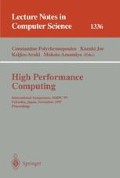Abstract
In this paper we consider techniques for improving the performance of codes for general sparse problems by extracting both local and global structure information from a sparse matrix instance. This information can be used to improve the performance of the primitives through the utilization of specialized methods for the component parts which result from the matrix decomposition. A calculus is defined for controlling the decompositions and algorithms are presented for implementing the techniques within a code development environment.
Support was provided by the Foundation for Computer Science (SION) of the Netherlands Organization for the Advancement of Pure Research (NWO) and the EC Esprit Agency DG XIII under Grant No. APPARC 6634 BRA III.
Supported by the National Science Foundation under Grant No. US NSF CCR9120105 and by ARPA under a subcontract from the University of Minnesota of Grant No. ARPA/NIST 60NANB2D1272.
Preview
Unable to display preview. Download preview PDF.
References
R. C. Agawal, F. G. Gustavson, and M. Zubair. A High Performance Algorithm Using Pre-Processing for the Sparse Matrix-Vector Multiplication. In Proceedings of the International Conference on Supercomputing, pages 32–41, 1992.
Richard Barrett, Michael Berry, Tony Chan, James Demmel, June Donato, Jack Dongarra, Victor Eijkhout, Roldan Pozo, Charles Romine, and Henk van der Vorst. Templates for the Solution of Linear Systems: Building Blocks for Iterative Methods. SIAM Publications, 1993.
Aart J. C. Bik and Harry A. G. Wijshoff. Nonzero Structure Analysis. In Proceedings of the International Conference on Supercomputing, pages 226–235, 1994.
L. DeRose, K. Gallivan, E. Gallopoulos, B. Marsolf, and D. Padua. A MATLAB Compiler and Restructurer for the Development of Scientific Libraries and Applications. To appear in Proceedings for the 8th International Workshop on Languages and Compilers for Parallel Computing, Columbus, Ohio, August 1995.
The Math Works, Inc. MATLAB, High-Performance Numeric Computation and Visualization Software. User's Guide, 1992.
Youcef Saad.SPARSKIT: A basic tool for sparse matrix computations. CSRD/RIALS, 1990.
Author information
Authors and Affiliations
Editor information
Rights and permissions
Copyright information
© 1997 Springer-Verlag Berlin Heidelberg
About this paper
Cite this paper
Marsolf, B.A., Bik, A.J.C., Gallivan, K.A., Wijshoff, H.A.G. (1997). The generation of optimized codes using nonzero structure analysis. In: Polychronopoulos, C., Joe, K., Araki, K., Amamiya, M. (eds) High Performance Computing. ISHPC 1997. Lecture Notes in Computer Science, vol 1336. Springer, Berlin, Heidelberg. https://doi.org/10.1007/BFb0024200
Download citation
DOI: https://doi.org/10.1007/BFb0024200
Published:
Publisher Name: Springer, Berlin, Heidelberg
Print ISBN: 978-3-540-63766-0
Online ISBN: 978-3-540-69644-5
eBook Packages: Springer Book Archive

